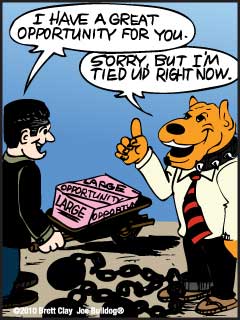Change Leadership — Secret # 75
Be Willing To Walk
Actions speak louder than words.
—Theodore Roosevelt
What I Need to Know |
One of the tenets of negotiation theory is that a deal will not close until both parties overcome the reluctance to walk away from the deal. So as counterintuitive as it may seem, you have to be willing to walk before you can get the order.
As I look back over my own career, I realize I may have been overly ambitious and impatient at times. There may have been some instances where I could have gained more by taking the deal than walking away. But there were also times where I should have walked away and didn’t. Ultimately though, I believe people usually err more on the side of setting their goals too low, selling themselves short, and accepting mediocre outcomes more often than they err on the side of walking away from gift horses.
Walking away from a potential opportunity is a hard decision. So, how do you know when to do it?
First, determine how much value you want to deliver and make the necessary investments.
Next, set criteria and goals for yourself and measure potential clients and changes against those criteria. If you want to be a highly valued change leader, you cannot tie up your resources with low-value changes. So you must be willing to walk away if your criteria are not met. It’s definitely scary. But remember: The deal will not close until you are prepared to walk.
What I Need to Do |
The first thing to do is not to be a fool. The economic discipline of game theory has a concept called “reservation price.” Reservation price is the price at which you are truly indifferent to whether you get the deal or not. Both buyers and sellers do themselves a tremendous disservice when they (a) fool themselves with inaccurate or emotional assessments of their reservation price, and (b) negotiate using a number that is different from their real reservation price. For example, if you say, “$100 is my best price” when you really would have accepted $80, you would lose an opportunity if the customer would have accepted $90.
Be disciplined in (a) thoroughly and objectively assessing your reservation price and other criteria, (b) walking away from opportunities that do not meet your price or criteria, and (c) quoting your real reservation price, even when there is a risk of “leaving money on the table.”
Action Summary |
|
 |



Social